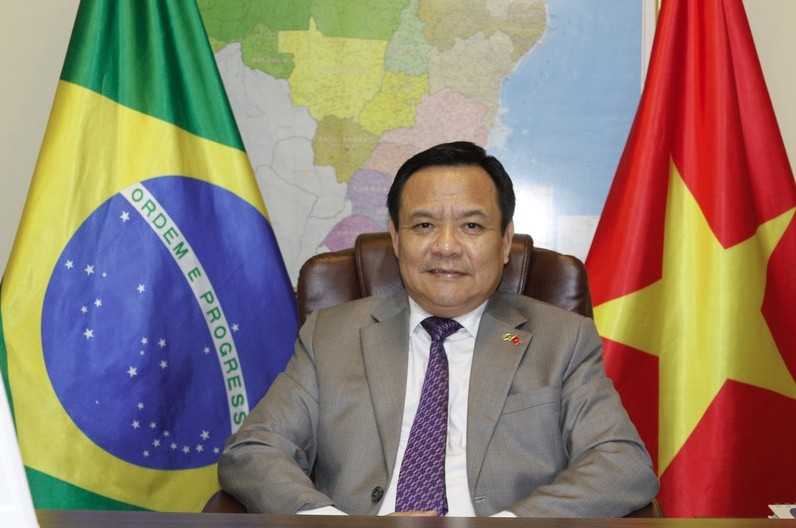PM’s participation at BRICS Summit affirms Vietnam’s rising global standing
Vietnam’s participation in the BRICS Summit in Rio de Janeiro at the inviation of Brazilian President Lula da Silva highlights the country's growing global role and sets the stage for deeper future cooperation.

Vietnamese Ambassador to Brazil Bui Van Nghi made the statement ahead of Prime Minister Pham Minh Chinh’s trip to Brazil for the summit and bilateral activities from July 4-8.
Ambassador Nghi noted that on June 14, Brazil, which is holding the rotating chair of BRICS for 2025, officially announced Vietnam as a BRICS partner country, joining nine others -Belarus, Bolivia, Kazakhstan, Cuba, Malaysia, Nigeria, Thailand, Uganda, and Uzbekistan.
BRICS includes 11 major emerging economies representing nearly half the world’s population, land area, and a substantial share of global GDP and trade. The partnership promotes peace, security, and development.
As a partner, Vietnam gains opportunities to engage in BRICS initiatives, shaping a more equitable and inclusive international order.
The ambassador emphasised key benefits for Vietnam, such as enhanced international standing, expanded economic cooperation with BRICS members in trade, investment, infrastructure, and technology, plus opportunities to both contribute to and learn from BRICS in healthcare, climate change, and technology. This aligns with Vietnam’s foreign policy of independence, self-reliance multilateralisation and international integration, balancing global relationships, he said.
The diplomat stressed that Vietnam becoming a BRICS country partner underscores its commitment to elevating developing countries’ voices, fostering international solidarity and multilateralisation based on respect for international law.
Hosted by Brazil under the theme “Strengthening Global South Cooperation for more Inclusive and Sustainable Governance” the summit prioritises global health cooperation, trade, climate change response, AI governance, architecture of multilateral peace, and institutional strengthening, closely aligned with Vietnam’s sustainable development goals, including high-income status by 2045, coastal climate adaptation, and digital transformation. BRICS health cooperation aids Vietnam’s access to advanced medical technologies; climate initiatives offer funding and technology vital for adaptation.
Vietnam’s participation in Rio Summit provides a platform to share pandemic management and economic development experiences, while learning from BRICS members on technology and governance. The partnership also bolsters bilateral ties with Brazil.
Discussions on trade, investment, technology, AI, and semiconductors may yield agreements supporting Vietnam’s development objectives, he said.
The ambassador stressed the BRICS partnership demonstrates Vietnam’s foreign policy of independence, self-reliance, multilateralisation and diversification of relations. It strengthens Vietnam’s role in a multipolar world where developing countries have stronger voices and highlights Vietnam’s success in building major economic partnerships while maintaining independence, self-reliance, confidence, in its external policy.
Regarding the impacts of PM’s trip to the Vietnam-Brazil relations, Ambassador Nghi said that recent high-level exchanges, including Prime Minister Pham Minh Chinh’s visits in 2023 and 2024, and President Lula da Silva’s visit to Vietnam in March, have propelled Vietnam–Brazil relations to new heights.
The 2023 official visit by PM Chinh marked a historic milestone, ushering in a new era of cooperation with foundational agreements and ambitious trade targets. In 2024, the relationship was elevated to a strategic partnership, expanding into technology and energy sectors. President Lula da Silva’s state visit in March further deepened and consolidated bilateral collaboration.
The Vietnamese PM’s 2023 visit was the first by a Vietnamese head of government in 16 years and the first high-level visit since 2007. It solidified the comprehensive partnership through four cooperation agreements in education, defence, agriculture (2024–2026), and diplomacy training (2024–2025). The two countries set ambitious trade goals - US$10 billion by 2025 and US$15 billion by 2030. Vietnam also proposed Brazil recognise its market economy status and engage in free trade negotiations with Mercosur. This visit fuelled momentum for economic and cultural cooperation, affirming mutual commitment.
At the G20 Summit in Rio in November 2024, coinciding with the 35th anniversary of diplomatic ties, Vietnam and Brazil upgraded their relationship to a strategic partnership, issuing a joint declaration. This expanded cooperation in technology, renewable energy, defence, and enhanced political trust, aiming to benefit both bilateral interests and global peace, stability, and sustainable development.
Brazilian President Lula da Silva’s visit in March launched the 2025–2030 Action Plan for the strategic partnership. Key achievements included Brazil recognising Vietnam’s market economy status, trade commitments, market openings, and Vietnam’s invitation as a partner country to the 17th BRICS Summit. These outcomes reinforced bilateral cooperation and boosted Vietnam’s global profile, he said.
The ambassador described these visits as tangible evidence of Vietnam’s foreign policy of peaceful, independent, confident diplomacy, rooted in Ho Chi Minh’s Thought and the resilient “Vietnamese bamboo diplomacy,” opening broader cooperation prospects with Brazil and other emerging economies.
High-level visits provided platforms to discuss not only bilateral issues but also regional and global challenges amid BRICS’ expanding influence. Vietnam’s participation in BRICS reflects its growing multilateral importance, contributing fresh perspectives and global solutions.
Ambassador Nghi also highlighted the embassy’s efforts to promote diplomatic, economic, cultural, and people-to-people exchanges amid rapid bilateral growth, especially following the 2024 strategic partnership and 2025 BRICS partnership.
Diplomatically, the embassy organised key high-level visits and supported Vietnam’s participation in international forums such as the G20 Summit. Economically, it promoted trade and investment through business networking, collaborating with the Vietnam Chamber of Commerce in São Paulo on workshops and forums across several Brazilian states in April. These efforts contributed to bilateral trade growing from US$7.11 billion in 2023 to US$7.98 billion in 2024.
Culturally, the Embassy hosts events introducing Vietnamese culture, including a 2024 Friendship Meeting for 35 years of diplomatic relations, the first-ever “Vietnam Day” in Brazil (November 2024), featuring a monument honouring President Ho Chi Minh in Rio, and celebrations marking the 50th anniversary of national reunification and the 135th anniversary of President Ho Chi Minh’s birth in 2025.
The embassy also participated in the 2025 International Food and Culture Festival in Brasília, showcasing Vietnamese cuisine and supporting social charities, he said.
The Embassy prioritises consular services and community activities that preserve national identity and promote Vietnam’s image abroad, added the diplomat.




